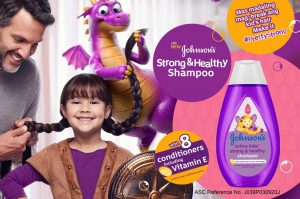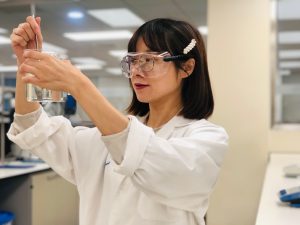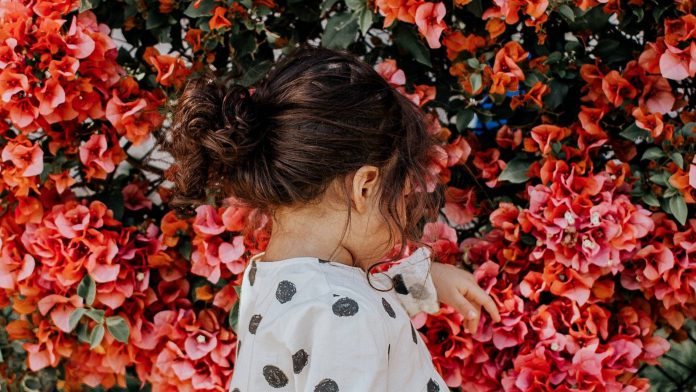My eldest daughter recently asked me, “Mommy, what is that?” and then pointed out my bottle of conditioner.
I replied it was my hair conditioner. To which she then replied, “but what is it for?” I explained that I use it to make my hair softer.
And of course, just like any normal inquisitive kid, she had to ask, “but don’t I need that too? So my hair can be soft as well?”
And that is when I realized, I know how to bathe my daughters and how to care for their skin, but do I know how to take care of their hair? I’m a believer of the “if it ain’t broke, don’t fix it” philosophy, so my daughters both have simple hair and skincare routines to date. But my eldest’s question caught me off-guard, so now I have to ask: Do 7-year-old girls need a hair conditioner? And in that case, does my 1-year-old daughter need specific hair care products as well? And what do we moms need to know about caring for our kids’ manes?
The good news is, Tracy Qiu, Johnson & Johnson Asia Pacific Baby R&D Manager shares insights on everything moms need to know about their kids’ hair.
What should parents know about their kids’ hair? Is it any different from their own/adult’s hair? How?
Tracy: At birth, baby hair is very fine (thin diameter) and much more delicate than adult hair. It also cannot grow very long. Sometime during the first year, baby hair is gradually replaced by primary terminal hair which can eventually be 2 to 3 times thicker than baby hair. Change in hair thickness is gradual, with relatively rapid changes around the first 3 to 4 years and slowing thereafter. Starting after puberty, the hair will change again, to secondary terminal hair, which is around 5 times thicker than baby hair.
How is caring for children’s hair different from caring for an adult’s hair?
Tracy: Several considerations are required here. First, the baby’s hair is thinner and more delicate than adult hair, and the same can be said of the scalp. Though hair and scalp mature quickly over the first few years of life, and more gradually over the remainder of the childhood years, they are still not considered the same as adult hair. Therefore, cleansers used for kids should be mild. Another consideration is that adults tend to secrete significantly more sweat and sebum, so they may require stronger cleansing products than kids. Finally, due to adult practices such as the use of hair styling or colorants, adult hair and scalp can become damaged in ways that may require special conditioners and treatments.
How often should parents wash their child’s hair?
Tracy: Key considerations are to make sure that the child’s hair and scalp are clean, comfortable, and free of unpleasant odors due to sweat, sebum, and bacteria. Hair wash frequency can vary based on season, how active the child is (including the amount of sweat secreted), activities (such as swimming), and hair type (oily or dry, straight or curly). Most experts do not recommend more than once a day shampoo-ing. Once every few days, or even a week or so, is sometimes considered sufficient depending on the circumstances.
What hair care products are required for children? Do they need to use conditioners or other hair treatments aside from shampoo? If not, when can they start using these?
Tracy: Because baby/child hair is thinner and more delicate than adult hair, and they generally secrete less sweat and sebum, gentle cleansers are recommended. As the child grows older and hair grows thicker and longer, especially for girls, conditioners may be useful after shampooing to help prevent tangles and damage. Conditioners can sometimes also help improve the appearance and manageability, especially for longer hair. Shampoos for children that contain conditioners, or gentle conditioners designed for kids, are recommended in these cases.
What should parents look for in hair care products for kids? How different are these from adult hair care products?
Tracy: Key considerations for kids’ hair care products include gentleness combined with effective cleansing that can remove dirt, sebum, bacteria, etc. Shampoos specifically designed for kids’ hair are recommended for this purpose. An important thing to remember about adult shampoos is that they are generally designed to be strong enough to clean adult hair, which is thicker and stronger than kids’ hair and tends to become more oily and sweaty. Therefore, using adult hair care products on kids’ hair can, in some cases, have potentially negative effects.
For children with thicker and longer hair, especially girls, shampoos for kids contain conditioner or a separate conditioner for kids’ hair are generally recommended.
Any tips on how parents can effectively teach their kids to wash and care for their hair?
Tracy: Loving and enjoying the bath/shampoo moment is one of the most effective ways kids can learn independence in washing and caring for their hair. Some other tips include:
- Consider allowing your child to select his/her bath/shampoo product. You can help guide them to the child-appropriate products section, but let them choose their own among the product choices there.
- Create a relaxed, comfortable environment. Encourage kids to try to wash/shampoo on their own. Be there to help in the beginning, when needed, but don’t push or criticize. Remember to encourage, encourage, encourage, and praise them for their successes.
- A no more tears bath/shampoo product can help minimize parental concern and/or distress for kids about eye irritation, and allow for a more enjoyable, relaxed experience.
Any general tips on how parents can take care of their kids’ skin and hair?
Tracy: Here are a few:
- Remember that your child’s skin and hair are still developing, and thinner and more delicate than adult skin and hair.
- Products that are designed for kids, to ensure mildness and the right cleansing efficacy, are recommended. Adult products can sometimes be too harsh or otherwise unsuitable for children.
- Select a hair care routine that suits the specific needs of your child, especially when it comes to conditioning. Hair that is longer and more difficult to manage can often benefit from the use of kids’ shampoos that contain conditioners, or even a separate conditioner designed for kids.
- Encourage your children to become independent in their skin and hair care routines.
Are there adjustments that parents should make in their child’s bath/shampoo routine considering the “new normal?”
Tracy: For the new normal, experts generally recommend more frequent and careful handwashing along with social distancing, but more frequent bathing/shampooing is typically not a common recommendation.

Ultimately, parents should use products that are specifically formulated for our kids’ needs. And for our kids’ hair, the NEW Johnson’s Active Kids Strong & Healthy Shampoo seems to be the right combination of gentle (for our kids’ delicate hair and scalp) and potency (to prevent amoy-pawis hair for active kids). Plus, it’s enriched with 8 conditioning ingredients and nourished with Vitamin E, so we can be worry-free when it comes to hair breakage.

Tracy Qiu is a Johnson & Johnson Asia Pacific Baby R&D Manager with over 13 years of working experience in the Johnson & Johnson R&D Organization as well as experience in the cosmetic and baby care industry. She also led the Asia Pacific new Johnson’s formulation design and development with shampoo as part of the scope.
Join our MomCenter Community on our Facebook page and Facebook group for more insights on motherhood and parenting.





